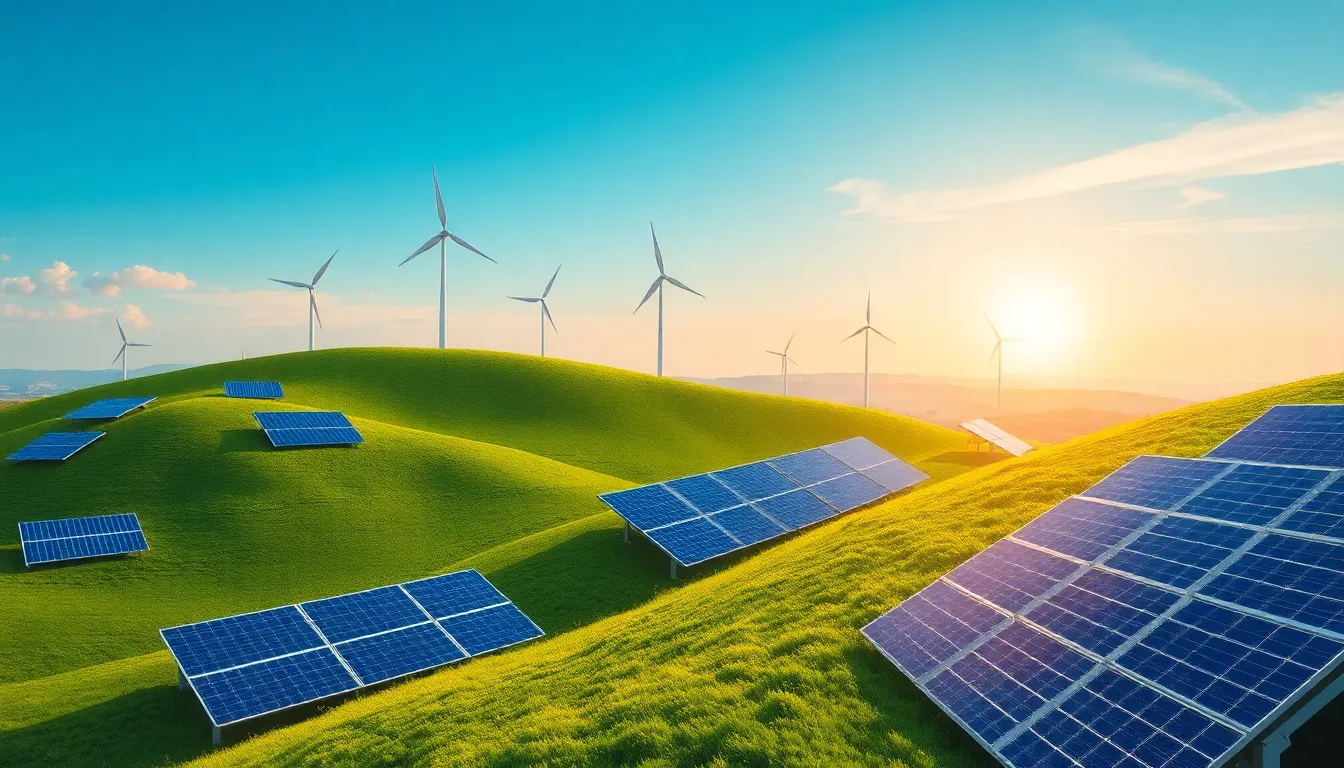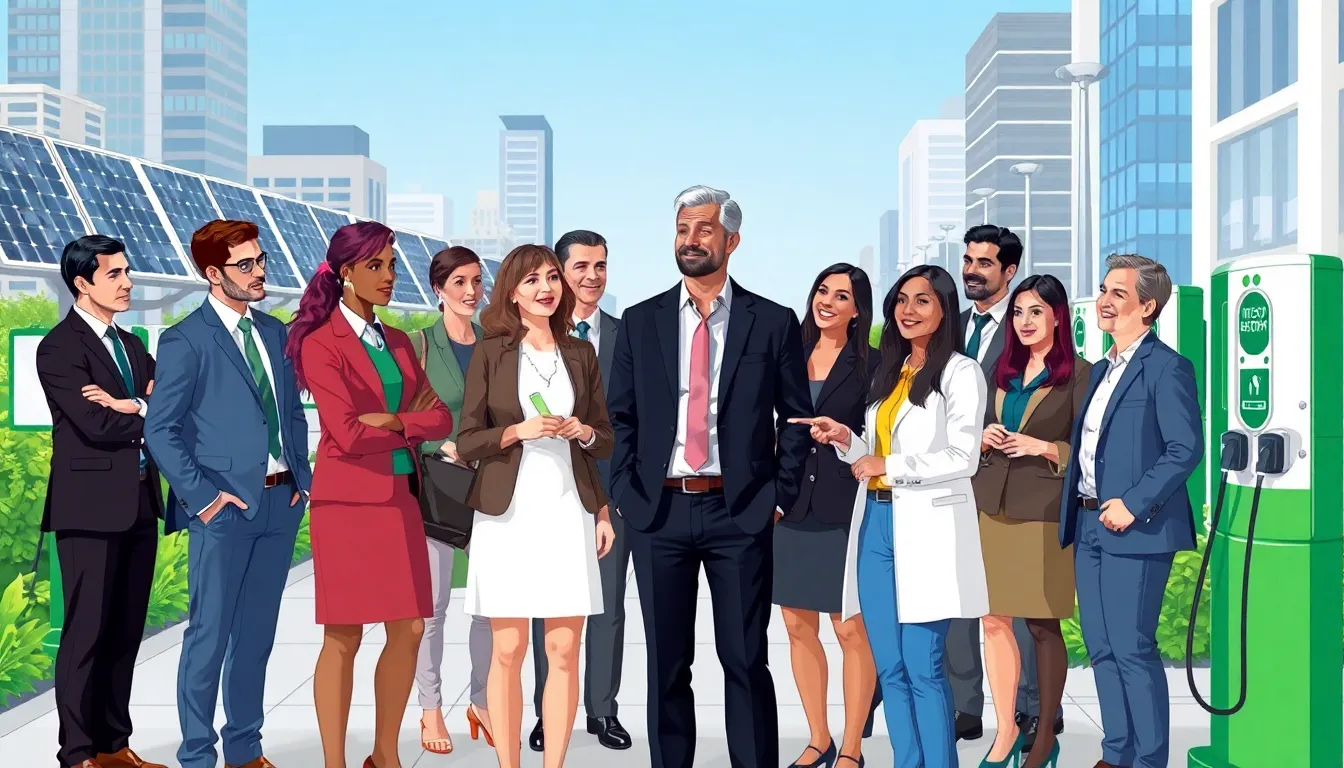In a world where climate change is the ultimate party pooper, green tech swoops in like a superhero in spandex. This innovative field combines cutting-edge technology with eco-friendly practices, making it the perfect solution to save the planet while still enjoying the perks of modern life. Who knew saving the Earth could be so cool?
Table of Contents
ToggleWhat Is Green Tech?
Green tech refers to technology that harnesses renewable resources to enhance sustainability and reduce environmental impacts. This field encompasses a broad range of innovations, such as solar energy, wind power, and bioenergy technologies. These solutions aim to minimize waste and promote efficient use of resources.
Green technology focuses on improving energy efficiency, reducing carbon footprints, and conserving water. For instance, energy-efficient appliances save electricity, resulting in lower greenhouse gas emissions. Sustainable practices, like using biodegradable materials, contribute to waste reduction in landfills.
Smart grid technology illustrates how green tech enables better energy management. Modernized power distribution systems optimize energy use and integrate renewable sources. This integration fosters resilience against climate disruptions and enhances energy security.
Electric vehicles represent another vital aspect of green technology. These vehicles help improve air quality by reducing reliance on fossil fuels. As more consumers adopt electric cars, the demand for charging infrastructure and battery recycling increases.
Innovations in green tech also extend to buildings and infrastructure. Green building practices incorporate energy-efficient designs, sustainable materials, and smart technologies. These approaches not only lower operating costs but also enhance occupant comfort.
Governments increasingly support green technology through policies and incentives. Tax credits for renewable energy projects encourage investments in clean energy. Partnerships between public and private sectors drive research and development in this essential field.
Together, these components of green tech contribute significantly to combating climate change. By fostering sustainable practices and innovations, they increase ecological preservation while maintaining modern conveniences.
Importance of Green Tech

Green technology plays a crucial role in fostering environmental sustainability and supporting economic growth. Its adoption leads to cleaner air and reduced resource consumption, making it vital in today’s ecological climate.
Environmental Benefits
Green tech delivers substantial environmental benefits. It significantly lowers greenhouse gas emissions through the use of renewable energy sources, like solar panels and wind turbines. Conservation of natural resources also occurs as industries adopt sustainable practices, protecting biodiversity and ecosystems. Innovative solutions, such as energy-efficient appliances, reduce energy consumption, leading to lower carbon footprints. Water conservation technologies, including rainwater harvesting systems, provide sustainable water management, reducing strain on freshwater sources. Ultimately, each of these advancements contributes to a healthier planet, ensuring a balanced relationship between technological progress and environmental stewardship.
Economic Opportunities
Green technology creates numerous economic opportunities. Investments in renewable energy projects attract capital and stimulate job creation in various sectors, including construction and manufacturing. Energy efficiency practices lower operational costs for businesses, enhancing overall productivity. The growing demand for clean energy leads to the emergence of new markets and industries, driving innovation and competition. Furthermore, government incentives and subsidies encourage companies to invest in sustainable technologies, facilitating growth in green sectors. Each of these factors promotes a robust economy while addressing critical environmental challenges, demonstrating the interconnectedness of sustainability and economic development.
Types of Green Technologies
Green technologies encompass various innovative solutions that address environmental challenges. These technologies boost sustainability and help create a healthier planet.
Renewable Energy Solutions
Renewable energy solutions include various technologies that harness natural resources. Solar power utilizes sunlight to produce electricity through photovoltaic cells. Wind turbines convert wind energy into usable power, showcasing a clean alternative to fossil fuels. Hydropower generates energy by using flowing water, offering another renewable option. Geothermal energy taps into the Earth’s heat for heating and electricity, demonstrating diverse energy generation strategies. These renewable sources significantly reduce greenhouse gas emissions and reliance on finite resources.
Sustainable Agriculture
Sustainable agriculture emphasizes practices that enhance food production while protecting the environment. Organic farming relies on natural fertilizers and pest control, minimizing chemical use. Crop rotation creates diverse ecosystems, improving soil health and productivity. Precision agriculture employs technology to monitor crop performance and optimize resource use. Such methods lower water consumption and chemical runoff, generating healthier crops and ecosystems. This approach supports biodiversity and contributes to long-term food security.
Energy Efficiency Innovations
Energy efficiency innovations focus on reducing energy consumption across various sectors. Energy-efficient appliances consume less electricity and water, lowering utility bills and minimizing environmental impact. Smart lighting systems adjust according to occupancy, further conserving energy. Building designs incorporate insulation and high-performance windows, enhancing thermal efficiency. Transportation benefits from electric vehicles that use less energy compared to traditional cars. These innovations collectively lead to lower carbon footprints and promote sustainable living practices.
Challenges in Green Tech Development
Green technology faces several challenges that impact its growth and effectiveness in combating climate change. Addressing these obstacles is essential for advancing sustainable solutions.
Funding and Investment Issues
Securing funding for green tech projects can prove difficult. Investors often hesitate due to perceived risks and uncertain returns on investment. Limited financial resources delay the development and deployment of innovative technologies. Policies that promote tax incentives and grants can enhance investment opportunities by mitigating financial risks. Governments and private sectors must work together to create a more favorable investment landscape, facilitating the momentum needed for advancements in green technology.
Technological Limitations
Technological constraints hinder the widespread adoption of green technologies. Current infrastructure may not support new innovations, resulting in additional costs for upgrades and retrofits. Scalability often presents challenges, as many green solutions are not yet optimized for mass production. Compatibility with existing systems remains a significant concern for industries seeking to transition to greener practices. Ongoing research and development can help overcome these limitations, enhancing the efficiency and effectiveness of green technologies in various applications.
Future Trends in Green Tech
Emerging trends in green technology focus on enhancing efficiency in energy use. Innovations in artificial intelligence enable better energy management, optimizing consumption and ultimately lowering costs for businesses and consumers. Smart home technologies amplify this trend by offering systems that automate energy-saving practices, such as smart thermostats and lighting.
Electric vehicle adoption continues to rise as battery technology improves. Longer ranges and faster charging options make electric vehicles more appealing, thus reducing reliance on fossil fuels. Additionally, the expansion of charging infrastructure supports greater accessibility, encouraging more individuals to switch from traditional vehicles.
Renewable energy storage solutions are becoming increasingly vital. Advanced battery systems allow for more efficient use of solar and wind energy, capturing excess power for later use. This flexibility empowers users to rely on renewable sources during peak demand periods.
Sustainable agriculture technologies are also making waves. Drones and precision farming tools provide farmers with insights that optimize resource use while maintaining crop yields. As a result, these technologies contribute to waste reduction and improved food supply chains.
Circular economy practices gain traction as companies recognize the importance of sustainability. Businesses seek to minimize waste through recycling and reusing materials, from packaging to production processes. Such initiatives not only preserve resources but also enhance brand loyalty among eco-conscious consumers.
Government policies continue to adapt to support these advancements, offering incentives for sustainable practices. Such measures encourage investment in green technologies, strengthening the market for renewable energy and eco-friendly solutions. As trends evolve, the collective efforts aim to combat climate change while promoting economic growth through innovative green technologies.
Green technology stands at the forefront of the fight against climate change by merging innovation with sustainability. Its diverse applications not only enhance energy efficiency but also create economic opportunities and promote healthier living environments. As the demand for clean energy continues to rise, advancements in green tech pave the way for a more sustainable future.
Challenges remain in funding and technological adoption, yet ongoing research and supportive government policies are crucial for overcoming these hurdles. The evolution of green tech will play a vital role in shaping a world where modern conveniences coexist with environmental responsibility. Embracing these technologies is essential for safeguarding the planet and ensuring a prosperous future for generations to come.


